EXTRA MATERIAL
Chapter Twenty-two - 1940-1941
Sin is a Cinch, That Made Me Smile
Usually lying is not an isolated vice.1Daniel Lord
A staff member once exclaimed that working for Lord waslike being tied to the end of a tornado.2
Two Stories Told by Daniel Lord
Almost Saved From Disgrace
A Catholic girl, decidedly Irish in ancestry and taste, met a patronizing lady of society and then told her adventures to a friendly priest.
Haven’t you quite a bit of English in you?The lady of fashion asked.
No,said the girl, emphatically.
Ah! then your are a Scot.
I certainly am not a Scot. I’m Irish.
Then you’re from the north of Ireland, aren’t you?
My family came from the south of Ireland, from Dublin in fact.
Oh,said the lady. And she turned away.
I was furious,said the girl to the friendly priest.
Well,said the priest, with a smile,at least she tried to make a respectable woman out of you.3
Ecclesiastical Comment
When Bishop Walsh took over the see of Charleston, he found presiding over his kitchen an ancient Negro named Eva.
How long have you been here, Eva?he asked. She looked at him solemnly.
Ah done buried three bushups,she answered, looking like a black fate.
Well,the bishop laughed,do you think you’ll bury me?
I ‘spec’s so,she replied, even more like a fate.But,the bishop protested,I’m a young man.Then Eva gave out with a piece of vast ecclesiastical wisdom.
Dey’s all young when dey comes.She shook her head solemnly.But dat don’t mean a thin’ Dey all grays-up mighty, mighty fast.4
The Queen’s Work 1940
In January The Queen’s Work ran Lord’s A Pamphlet Complete in This Issue
entitled Well — Such is Fame
that describes how all the greats of early films have been forgotten. This article shows Lord’s knowledge of early movies and his love of good movies and good actors. In later months Lord included several complete pamphlets with Father Hall talking to Dick and Sue and Ford Osborne. Lord’s novel Clouds Cover the Campus appeared in serialized articles.
The regular features in the magazine were The Voice of the Movie Audience
with ratings of current movies, People and Things We’d Like You to Meet,
School Sodality Personals
with news items and photos of local Sodalities, Picture of the Month
submitted by readers, Just Ask Me
in which Lord answered questions from readers, Dear TQW
(The Queen’s Work), Catholic School Directory
which listed Catholic schools across the country, Bookshelf Notes on the Cuffs
—book reviews, Knights, Handmaids, and Pages of the Blessed Sacrament,
Character Builder for (Current Month)
by Charles A. Imbs, S.J., Mental Prayer,
and Psychology for Leadership.
Catholic celebrity interviews included tenor Dennis Day just becoming popular on the Jack Benny radio show and the famous radio comedian Fred Allen. At the end of his life Allen published his autobiography Treadmill to Oblivion describing his fall from great popularity to obscurity. An article featured Radio Priest Father Hughes from Tucson
who did radio catechetics.
Salesmanship, Not Syllogisms
In November Lord was in New York for a meeting of the National Catholic Evidence Guild. Formed in England in 1918, the group trained lay persons to go out in public to explain and defend Catholic belief and practice. The New York Chapter still exists. Thought, not a Queen’s Work organization, Lord supported it and ran several articles on it.
A Herald Tribune story, Salesmanship, Not Syllogisms, Urged by Jesuit,
quoted Lord’s talk:
How far do you think a first-class advertising man would say that the methods by which we are appealing to people and are trying to sell Catholicity to the United States will go—psychologically and by the standards of good practical salesmanship?
We priests get up in the pulpit and give the congregation Catholic theology, which is faith. But in the pews they are not thinking in terms of theology. They are thinking of the immediate needs which they want supplied. Before we begin, we must ask ourselves:What are they thinking about?What do they want?What do they need?notWhat do I think they need?When we find out, we must persuade them that we have it. That is an old principle of salesmanship.5
Swing Music
Asked about the morality of swing music which was popular at the time, Lord replied to Father Martin Carribine, S.J.:
Musically, I think that most of it is noisy, nerve-wracking and savoring of the screech. It is musical yowling in large part. Only the really great masters do it well...and there has been a decided tendency to play down the noise...which at first was the essence of the thing.
. . .
Swing? A lot of nuts use it as an excuse for a nervous breakdown and musical acrobatics. They dance ridiculously to its strain (and I mean strain, not strains). Personally I think it’s a sort of giant-swing done on a clarinet. It’s noisy, but is it art?
Maybe this doesn’t give you any help, but I think by the time we get through discussing swing, we’ll probably be having swing’s successor. And maybe that will turn out to be waltzes a la Strauss or the minuet in some modern form.6
Obviously Lord got it wrong on the future of popular dancing. And Lord told this story:
Maybe No Slip
I was pounding along on the good old typewriter, and what I meant to write was
So Christ drove the frantic devils into swine.But my typewriter took things in hand, and I found I had written:
So Christ drove the frantic devils into swing.7
Pamphlets of 1940
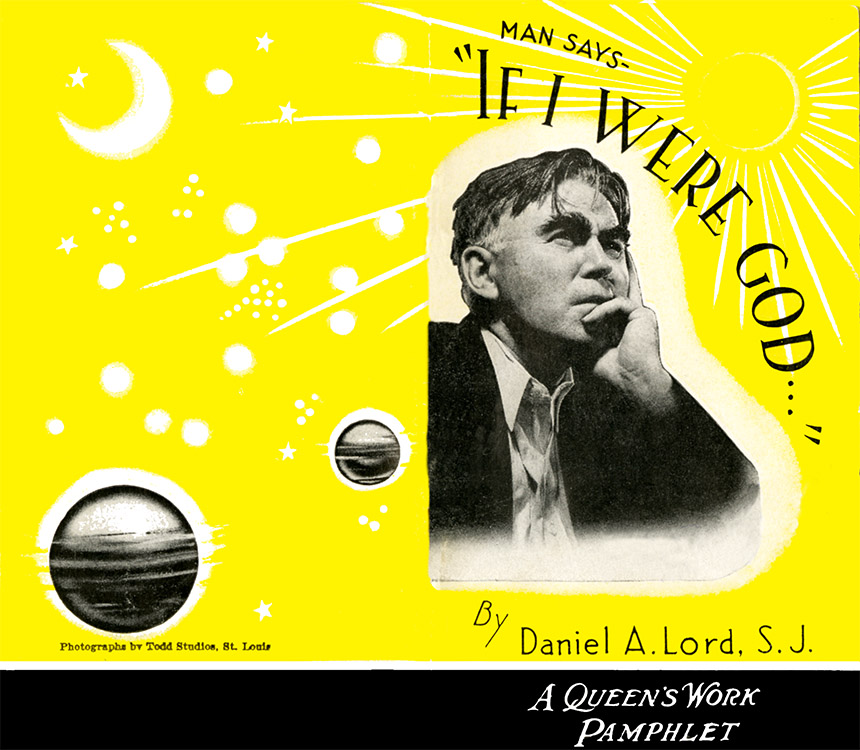
Death Isn’t Terrible
Man Says: If I Were God . . .
So You Won’t Fight, Eh?
What Is a Jesuit?
What is Decent Literature?
Why Be a Wallflower?
You’ve a Right to Be Happy
The Mystic Tree (a Christmas pamphlet)
In Death Isn’t Terrible Lord takes his belief in life eternal to its logical conclusion that death cannot be bad.
Only three things make death terrible for the person who dies. One is a lack of faith. The second is a tense, clinging to earth and the people and things of earth. The last is mortal sin on the soul of the dying.8
If one does not get to heaven: It is terrifying to enter eternity with hands stained with murder, a body soiled with lust, a mind clogged with impure pictures, a heart already yielded up to the devil.
9 Yet for others, Lord wonders:
Sometimes one is amazed to find how many people have given up God simply because of the death of a person they loved. A young husband loses his wife; he lifts his fist and curses the cruel God who snatched this girl and her beauty and her romantic love, and he kneels to him no more. A mother holds her dead child against her heart and feels the heart turned bitter in hatred. She can no longer love the God who killed her baby.
That note runs through much of modern literature: death is a cruel, vicious, relentless enemy; it stalks the human breed and in the end, with one last hyena laugh, claims its victim; a God responsible for so ugly and enemy must himself be ugly.
So you walk through cemeteries that are supposed to contain the bodies of buried Christians, and you find there the most frankly pagan symbols of death the destroyer. Death is symbolized by a broken column; life has been smashed and ruined by the blow of cruel death. Death is an extinguished torch—the light and warmth and brightness of life ended. At the tomb stands a weeping angel, his—more frequently her—head bowed in hopeless grief. Death is presented snatching the chisel from the hands of the great sculptor. Death blinds the eyes that once were bright in love and anticipation. Death is the Grim Reaper, who crackles in the back of his skeleton throat as he swings his scythe. And wheat and weeds and summer flowers all fall as his cruel blade swings through the once-golden fields.10
Even in war:
Then the brave soldier falls. But the blow is the blow of death and not of mortal sin. Over his head sounds a trumpet blowing, not taps, but reveille. He is dead yet he is on his feet. His body lies cold and motionless, but his soul swings along paths of glory. There is no grim trudging back to the trenches, some position that he must hold whatever cost to himself. There is no stolid marching into another battle. This is the triumphant parade that follows victory.11
Lord seems to not consider how brutal death in war can be. However he does note: Man has made death more torturing than God ever meant it to be. The awful burns inflicted by modern industry are preludes to lingering deaths.
12 Lord wrote this pamphlet in late 1939 on the eve of World War II which would take the human ability to kill other humans to a new and horrific scale.
Although this pamphlet would have 27 printings and sell over 111,000 copies, Lord avoids the tough question of why a loving God allows such suffering. A woman who loses a child can lose her faith because the belief in a loving God who is supposed to be in control and taking care of things no longer makes any sense.
So You Won’t Fight, Eh?
It is unclear exactly when Lord wrote So You Won’t Fight, Eh?; either in 1939 or 1940. Lord notes the shift in attitudes after Hitler went into Poland in September of 1939. In the US, the draft was authorized by Congress on 16 September 1940. The imprimatur for the pamphlet is 7 November 1940. The pamphlet would have been read with the draft in operation. America entered the war in December 1941. Lord invited readers who disagreed with him to write and he would put their letters in The Queen’s Work. The number of copies sold of this pamphlet is unknown.
Lord gives four positions on military service: Two of them are unjust and not merely anti-Christian but anti-human.
13
My Country, Right or Wrong
1. One will fight for his country no matter what, even if his country is in the wrong. This is a wrong attitude.14 The terrifying thing is that at the sound of war and in the roar of propaganda all question of justice is forgotten.15
A Just War
2. The country declares a war which is clearly just. It is for example clearly defending its liberties, its rights, its citizens. I see that the war is just, probably a war of strict defense, and I give my support to it. This is a reasonable attitude and I am justified in taking it.16
My country is attacked, and the war is clearly just. All the essential conditions of a just war are fulfilled. The enemy is the unjust aggressor. Apparently we can save our liberties only by fighting.17
Too Easy?
3. I am so opposed to war that no matter how just the war may be I refuse to take part in it. But my reasons for not taking part are simply that I hate and despise war. I regard it as brutal, wasteful, bloodied. War demands that I risk my life and do hard disagreeable things. I see no good results from war. So for these reasons (plainly selfish) I refuse to fight. This attitude is wrong.18
A Harder Way
4. I am opposed to all war, no matter how just it may be, because I am doing harder things than fighting. I am daily practicing heroic love of my fellow man, Christlike charity. I have no enemies, personal or national, in my heart. . . . I am less antiwar than pro-peace, less antihate than pro-love, less worried about killing my country’s enemies than about saving their immortal souls. This attitude is just.19
Lord further explains the Too Easy?
position:
The third attitude is that followed today by most of the pacifists. Since war is a bloodied, dirty, inconvenient, extravagant business, they’ll take no part in it. They refuse to blow the country’s resources away in high-powered shells. They won’t give their approval to that wasteful mass of metal known as a battleship, a tank, or a bombing plane. They decline to go into the trenches with the cooties [lice] and the rats. They would rather live at peace than at liberty, rather live under a dictator than under a general, rather be regimented in totalitarian states than wear the uniform of an infantry man in the regiment. They point out that all wars are followed by frightful depressions and that the wages of war are famine, broken bodies, jazz-mad souls.20
There are several problems with Lord’s views on this third position. First, he lumps together the thoughtful and conscientious pacifists with those who avoid the draft for selfish reasons. He doesn’t want the resources of the world, which he is sure are meant to give him comfort and luxury, blown to atoms.
21 Lord is wrong. Thoughtful pacifists want the resources for schools and hospitals.
The Lord is mixing the true pacifists with the true slackers. The man who puts his selfish desire for life and ease and peace ahead of the needs of this country is a coward and slacker.
22 Slacker
is an unfortunate and judgmental term, often was used to shame men who did not want to enter military service regardless of whether their reasons were selfish or noble. It was used even against those had legitimate personal reasons for not wanting to go to war, such as a wife and family or other family responsibilities. The term was also used against courageous men who opposed war on moral grounds and who were often more aware of the realities of war than those supporting war.
Adam Hochschild’s book To End All Wars: A Story of Loyalty and Rebellion, 1914–1918 vividly describes the courageous pacifists in England during World War I and the appalling treatment they received. It also describes the propaganda efforts in England to keep citizens from knowing the realities of war.23
The second problem with Lord’s position is that he sets up a false dichotomy that there are only two options: fight in this war, or surrender to life under a dictatorship.
Also Lord, like many Americans, given the horror of the German actions under the Nazi leaders, assumes the Allied cause was a Just War without considering all the tough questions. Lord himself was critical of World War I and its results. World War I was frequently cited by pacifists for their positions. They could point to the fact that World War I created all the conditions that led to World War II in Europe.
In later years Lord’s views on war would evolve and become more nuanced. Very likely his views on war would have changed had he lived long enough to see the Vietnam War which forced many people to rethink their attitudes about war and what is a Just War.
What is a Jesuit?
Lord wrote What is a Jesuit? in 1940. It gives an overview of the Jesuits and their history. Lord describes Jesuit training. He talks about the origin of the word ‘Jesuit’ and the misuse of the word for prejudicial and often inaccurate views of Jesuits
Lord also lays out the theology behind the Jesuits:
1. God created the world for His honor and glory and the happiness of His human creatures—men and women.
2. God the Father asked these children to manage the earth devotedly, to handle the good things of earth unselfishly, and to make their brothers and sisters happy.
3. Regretfully history here enters to point out that the majority of men and women have made an awful mess of their management. Wars and oppressions, vices and crimes, greed and lust, selfishness and exploitation—these make up man’s pitiful record, often outweighing the good he has done for God and his fellows.
4. So God, in order to show His sons and daughters how they ought to live and in what fashion manage the earth, sent His only-begotten Son, Jesus Christ, perfectly to live, beautifully to do His "Father’s business," and heroically to die, that truth might triumph and virtue prevail.
5. Christ, the perfect Son, called upon men and women to follow Him in bringing happiness to earth and right order into the management of God’s world.
6. Though Christ meant this invitation for all mankind, He divided His followers into two main classes:
a. All men and all women were invited and ordered to keep the commandments of Moses, Christ’s own two great commandments of love, and the Beatitudes.
b. There were however men and women who wanted to follow Christ far more perfectly. To these men and women, as to the rich young man, Christ said:
If thou wilt be perfect, go sell what thou hast, and give to the poor . . . and come, follow me.24
The pamphlet also gives current statistics on the Jesuits. The pamphlet would be updated twice.
Lord was the biggest promoter of Jesuits in his time. Very likely a number of men became Jesuits because of Daniel Lord. One wonders if Lord’s methods of promotion could be dusted off and tried again today. But of course his big secret on so much of what he did was that he believed he had something great to tell people about. Lord’s own belief in what he was doing had a powerful and attracting effect on people.
Lord published What IS Decent Literature in 1940: a very important pamphlet for understanding Daniel Lord and for understanding his thinking in writing the Motion Picture Production Code. In fact he takes credit for writing the Code in this pamphlet.25
Lord is guided by several overlapping principles that apply to literature, (including plays and movies). Literature should not teach people how to do bad things. It should not encourage people to do bad things. Vice should not be made to seem virtue. Vice should not be made attractive. Wrongdoers should not be made into heroes. Lord always wanted literature where Villains are Villains
. Lord did not like it when wrongdoers got away with it. In asserting these principles Lord always had in mind those who were the most vulnerable to influence: young people and children.
In this pamphlet Lord refers to a wide range of writers and assumes his audience knows them: Coward, Dumas, Hellman, Hemingway, Hugo, Ibsen, Joyce, Kipling, Maugham, Russell, and Shaw. Lord pamphlets are not light-weight. Lord even goes into a discussion of philosophy to define ‘decent’.
Scholastic philosophy sees man in his entirety: He has a body, but he is not merely an animal; he has a soul, but he is not an angel; he has a series of essential relationship with his fellow men, but he also has unbreakable relationships with God; he has duties to the state, since he has a social nature, but he has duties to himself that no state can touch.
Every action then that builds a man up in all these relationships, that makes him more a man and less a mere body, more a social being and less a selfish maverick, more a child of God and less a relative of the animal kingdom is splendid and moral and fine—and decent.26
Lord laments that writing style covers wrong doing. Although he loved reading The Three Musketeers as a child he admits that D’Artagnan was a bad person. As a youngster I honored a villain as a hero. Dumas saw to it that I did.
27 This pamphlet would go through 21 printings and sell over 113,000 copes by 1963.
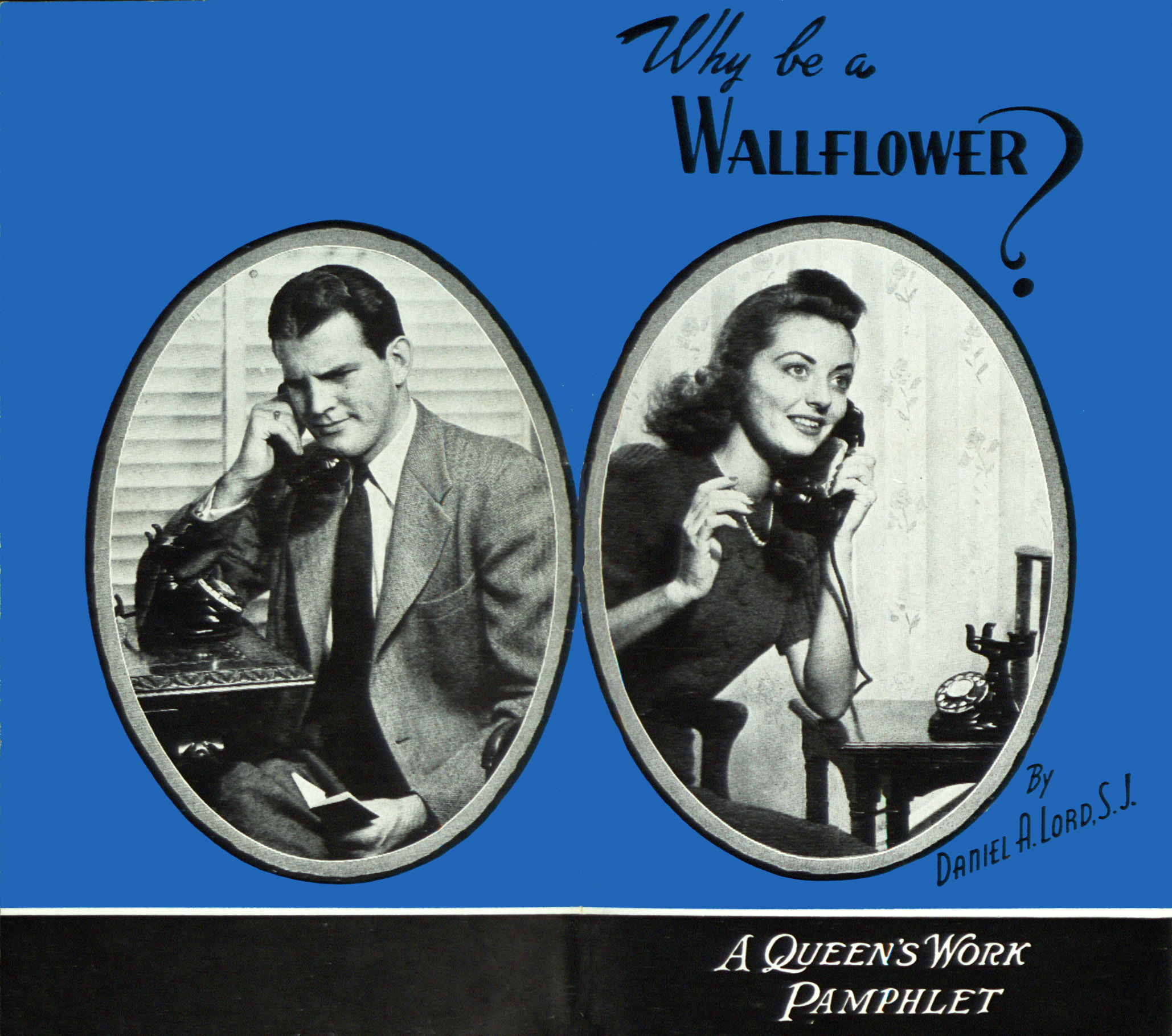
Lord wrote Why Be a Wallflower? because after he wrote What to Do on a Date in 1935 he received many letters that asked the same question, How does a person get a date?
So Lord wrote this pamphlet which is a general discussion of dating. He gives many suggestions such how to be more appealing through manners and dress. Lord talks about the role of families in helping young people meet other young people. A young person today who read the pamphlet might learn something from it, but would also find much of the pamphlet very dated.
What Lord does not tackle is the problem of those who are very shy and uncertain about dating. He does not talk about those who have a problem getting up the courage to ask someone on a date. Nor does he talk about those who have been rejected enough that they doubt their worth and attractiveness. Very likely, Lord, who he grew up with so much self-confidence, did not really understand true wallflowers: shy and very insecure people.
You’ve a Right to Be Happy
An insightful and still relevant pamphlet, You’ve a Right to Be Happy is essential for understanding Daniel Lord. Happiness is a key component of his belief system and his theology. He believed that religious faith and moral living would bring happiness. Lord’s own words say it all:
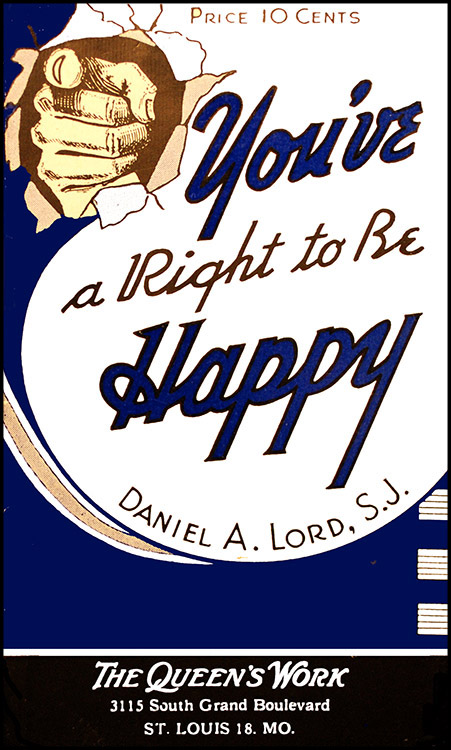
You’ve a perfect right to be happy. So if you are not happy, it’s not God’s fault. And you’d be wise to find out just what is wrong.
It is the insistent effort of God to make men happy, an effort met by the fierce struggle of men not to be happy.
The more I live with people and the more I see of life, the more of a puzzle human beings are to me. A thousand times I’ve said that God almost ceases to be mysterious by comparison with the enigma man.28
Frankly I wonder that God hasn’t long since tired of the whole stupid business and said, with a shrug of His divine shoulders,
All right then, my fine fellows; be as miserable as you wish. I’ve done all I could to make you happy. But have it your own way. Stew in your own unhappiness. Have a good hard cry in the midst of your handmade grief.For history and literature leave no slightest doubt that the vast majority of all human woes are not only man-made (as indeed are all real human miseries) but are pursued with as much energy and tireless zeal as is prospector’s gold or the fountain of youth. Off the nations march to war; though if they would read the simplest history or rake around in the ash heap of their own memories, they’d remember that war has from the dawn of remembered record been the source of nothing else but mass murder, poverty, famine—the sweeping charge of the four horsemen, followed by the dismal hangover of exhausted peace.
Men go on exploiting their fellow men, making life bleak and burdensome for them, and then wonder that the gold they coin from sweated blood doesn’t make them happy. From time immemorial men have ridden the backs of slaves and complained that the ride was uncomfortable. As if the backs of human beings were ever meant to be saddled and ridden! They have kicked the servant who waited on them and then shed tears because he didn’t love them. They have oppressed those subject to their power and have been hurt and lugubrious because the crushed didn’t welcome them home with shouts of joy and a triumphal arch.29
I watch with endless amazement the number of people who refuse to believe that more money than they can possibly use is nothing but a burden and a curse. They work-—as no slave on a treadmill ever worked—to make themselves the biggest fortune in their city; they gain their objective, sit astride their mountain of gold and stocks and bonds, and then wonder why they have been stricken with the occupational disease that is the nervous breakdown. They give their children fat allowances in place of paternal love and are amazed when those children turn out to be brats and prodigals and the joy of the sensational tabloids.30
Lord rejects the idea that happiness can be found in fame by those who elbowed one another for a place in the sun, the spotlight, the rotogravure page, or a hieroglyphic on a papyrus.
31
It just looks as if men and women don’t want to be warned that this course or that has always led to unhappiness. Experience they cast aside as not applying in their particular case. They hunt down unhappiness with horse and hounds and then blame God when they succeed in overtaking it.32
A painter sets up his gigantic canvas, and he finds when he has finished his landscape that he has imprisoned only a tiny sector of the earth’s limitless beauty. On his painted canvas the birds do not sing; there is no perfume in the flowers; the breeze doesn’t stir the graceful fronds; the seasons do not come, each with a set of colors, to change at the quarter year the face of the canvas.33
Yet earth will never cease to be a marvel to the poet, the scholar, and the saint—most of all however to the saint. . . . The saint wonders at the bounteously supplied larder from which man draws the endless variety of his foods. The flowers amaze him-—their variety, their perfume, their texture, their obvious symbolism.34
Under the subtitle More Than Enough
Lord notes the abundance of the earth:
Just so that His children would not need to quarrel over the distribution of the goods of the earth, God placed in that earth plenty and more than plenty for all. More food than mankind could possibly eat. More fur than they could possibly wear. More land than they could ever till. More gold and precious stones than were needed by all the kings and lovers of history. More beauty than a million painters could capture. More forests than need be cut to house a thousand generations. More coal than could conceivably be mined. More streams than could ever be fished. More miles of ocean than all the fleets of the world could ever congest. More mountains than sturdy climbers could hope to explore. More wealth than the wildest prodigals among sons or nations could ever waste. More territory than the most adventurous could explore and reduce to peaceful farmland.35
Under the subtitle Enter Man the Villain
Lord describes how humans ruin God’s paradise. Honestly we are in doubt which we should find most astounding: the generous outpouring of God’s bounty or the senseless grasping of man’s selfishness.
36
Lord describes the failure of the Israelites in the Old Testament. They answer by racing to the groves whose priestesses were prostitutes and by falling on their stupid faces before a little undeveloped cow they had seen their own goldsmiths fashion from cast-off rings and bracelets.
37
In this pamphlet Lord includes a section, Vetoed Phrases,
that includes ethnic slurs. Lord also has sections Blame God
and Buck Passer.
This is an important pamphlet because it gives Lord’s vision of how religious faith and moral living could transform the world. The title might make one dismiss it. This is also an example of Lord the idealist thinking big and exploring the question of what the world could be: If the world would only live by Christ’s teaching, what a happy place it would be!
38
Revue in Silver
Lord did two shows in 1940: Revue in Silver and The Election Year Follies of 1940. Lord wrote his musical, Revue in Silver, for the female students at Webster College. Performed November 7-9, it marked the 25th anniversary of the college.
The first scenes describe the origins of the Sisters of Loretto in Kentucky and the first graduating class at Loretto College. The song Just Try to Change the Girls
follows:
For you can change the fashions they wear;
Or you may change the style of their hair;
Change the nation,
The era as well;
You may call them Fraulein,
Senorita, or mam’selle. . .
Perhaps they tour in stratosphere whirls,
Or sedan chairs that misses no curls.
Change the planet,
A hill of granite,
But just try to change the girls.
Lord included scenes on Freshman Registration and the Crowning of the May Queen. The show includes the songs Nothing Ever Happens at Night,
It’s Merely a Matter of Books,
What Shall I Wear Tonight?
for the prom scene and Isn’t It the Truth?
:
I sit beside the telephone, and wait and wait and wait,
Isn’t it the truth? Isn’t that the truth?
Nobody calls, I’ve not a thing to do, and not a date.
Isn’t that the truth? Isn’t that the truth?
But if I have an awful cold,
Ate onions with my steak;
Then the phone’ll ring;
Lordee, how it rings.
Or if I have been campused,
If for bed I make a break. . .
Listen to it ring;
All the fellows ring.
They all
Will call.
They guess I can’t go out. . . that’s why they call.
A ballet is the climax of the show before the Finale song of Webster, Lovely Webster
We’ve Much to Give Besides Our Song
in Election Year Follies
The Election Year Follies of 1940 opened on Easter Monday, March 25, to a packed house. The city paper, the St. Louis Post Dispatch reviewed opening night:
Though many of last night’s numbers had all the slickness of a Broadway opener, and though the boys and girls of the singing and dancing choruses smiled over the footlights with professional brightness, the show was essentially amateur and intimate in spirit. The cast of 600 frequently overflowed from the stage for torchlight parades down the aisles. Audience and actors joined forces from time to time to make the humor boisterous.
. . .when at the end he [Lord] appeared to the audience’s calls of
Author,he knew that he had produced another hit.39
The show had sixteen performances. 13,256 people saw the show: 1,200 nuns were given comp tickets. The show cost $8,432 and lost $526. The show program states:
Note: Any resemblance to actual people, either living or dead . . . any resemblance to actual people . . . any resemblance . . . but what good is a democracy anyhow if you can’t have a bit of fun with your public servants.
The Place: The Good Old U.S.A. where we still can speak our mind, where there are summer and not concentration camps, and where the only one who spies on us is little brother Willie.
Act I
1. Opening Chorus
It’s not Orson Welles or Lights Out;
Just the parties drag their fights out.
Candidates become our actors,
City chaps pose running tractors.
It’s our every four year circus.
How the spell binders will work us!
It’s a custom democratic,
And it gets my vote emphatic
Elections,
And ain’t they fun?40
2.March of the Candidates(A song of campaign promises.)
To the Browns and Cardinals, the pennants this year?
For Adolph and Stalin a soc’ in the ear?
(St. Louis had two baseball teams: both would win pennants in 1944.)
Our Platform is as stable
As Hollywood’s nuptial vows.41
3.He Carries a Brief Case(A journalist tries to interview a Senator.)
MAN 1:
Washington is just getting overrun with lunatics.MAN 2:
Republican Party must be coming back into power.42
4.If Yankee Doodle Came to Town(A song that compares Yankee Doodle fighting the British
and the Indians to fighting modern traffic, racketeers, communists, and worse.)
The Iroquois could learn a lot the scamps,
From Hitler and his concentration camps.43
[Keep in mind that this was written in 1940 before the unimaginable scale of Nazi attrocities was known.
Regrettably, Lord held stereotypcial views of Native Americans.]
5.Washington Comes to Mr. Smith(A sketch about an idealist young Senator coming to office
only to be overwhelmed by special requests.)
6.Honey, You Get My Vote(A love song.)
7.Guess Who
Guess who is sadly wishing
That Roosevelt’d stay fishing.
Who runs when Edgar Hoover chases graft?
The GOP may clamor,
But gosh, they’re short on glamour.
Guess who, with Dewey, Vandenburg, and Taft.44
8.At the National Convention(In this song and sketch the Star Spangled Banner
is sung by Madame YellboScreecherini. Actress Martha Raye runs for Speaker of the House.)
9. Ballet:The Making of Flag
Act II
1. Opening Chorus (A song about Americans not wanting to get involved in Europe.)
Bombers serve their breakfasts every morn.
Douse your lights, there goes the blackout horn. We don’t care For Over There!
Gosh, we like the place where we were born!45
2.Three Bad Little Boys God To Bed(This satirical sketch is about three fighting children in their cradles:
Hitler Goering, and Stalin.)
3.By the Kind Permission of the Moon(Another love song.)
4.Mis-Information Please(A sketch parody of the popular radio quiz show Information Please.)
5. Prologue and Ballet: Democracy is Born—The Sermon on the Mount
(This piece ties the principles of democracy to the teaching of Jesus.)
Let’s take democracy. Ah, take it,
For the tyrants armies break it
And leave it dead on history’s shore,
Crushed ‘neath the tanks of lightning war.
Take it and hold it in your heart;
Make of your very soul a part—
The right to kneel and worship God;
To own the land of your fathers trod;
To build a home, to speak the truth,
To train for liberty our youth.
Democracy? How swift it dies
When fed on hatred, greed, and lies.
When God the Father’s exiled, then
There is no brotherhood for men.
When Christ’s own love gives place to hate,
Democracy has sealed its fate.
Dictator’s heel upon it stamps.
It rots in concentration camps.46
6.The Nine Old Men Are Youngsters Now(A song and sketch on the Supreme Court.)
We were nine old men.
Stern and cold old men,
And we owned the Constitution.
But since
Of Thee I Sing,We’ve been put to swing.47
(Of Thee I Sing was a 1930s musical with music by the Gerswhins.)
7. O’Reilly For President
Sure and the White House’s
Exactly the right house
For someone of Irish descent,
Laughter and merriment,
That’s what he’d represent,
If he were picked for president
. . .
O’Reilly, Commander-in-Chief.
Depression would end.
There’d be nobody sad
With corned beef and cabbage for all on relief.48
8. Ha! Ha! Ha! Ha! We’ve Got the Vote
I haven’t Cadillac, yacht, or valet;
I haven’t a mansion or polo mallet;
I haven’t a wad—but I’ve got a ballot Here’s November! Let’s go and vote!49
9.We’ve Much to Give Besides Our Song
10.It’s My Country Too
11.America, We’ve Just Begun: Closing Chorus
LeVern Hutcherson
The star of the show was LeVern Hutcherson. Lord wrote two songs for him: We’ve Much to Give Besides Our Song,
a song asking that African Americans be seen for all their contributions and It’s My Country Too,
a song calling for equal treatment of African Americans.
During the 1953 summer season, Hutcherson would sing the lead in Porgy and Bess on Broadway. Lord would see the show and they would have a delightful reunion backstage.50 Hutcherson would later tour with Porgy and Bess in Europe. He would perform in a revival of Carmen Jones on Broadway and would sing the vocal track for Harry Belafonte in the 1954 movie Carmen Jones.
The SSCA
For the 1941 Summer School of Catholic Action read:
at
The SS of CA
Spirit & Skill Make the Leader
Train with Mary’s Sodalists
for the defense of
The KINGDOM OF CHRIST
at
The SS of CA
Pamphlets of 1941
A Cure for Headline Jitters
Don’t Be a Liar
Don’t Hate Your Job
Going Steady
Here’s Why We Love Our Country
Mary After Her Son’s Ascension
So We Abolished the Chaperone
This Virtue Called Tolerance
When We Go to Confession
Over the Christmas Hill
Lord wrote A Cure for Headline Jitters during Christmas season 1940. By this time, Poland and France had fallen to the Germans and the British Army had evacuated at Dunkirk. Months of German bombing of cities in England had led to the Christmas Blitz over Manchester. Lord admits he suffers from ‘Headline Jitters.’
Lord gives two examples of facing frightful events. He describes Louis Egan’s experience of walking on a California road and seeing an earthquake come toward him: a wave moving down the road. It hit him, and Egan had the terrifying experience of feeling nothing solid beneath. But the wave kept moving and he watched it go off into the distance.
Lord then describes a scene from the 1940 movie The Fighting 69th, starring James Cagney, with a Joyce Kilmer character. So it was with real joy that I watched him fare forth to battle, rifle on this shoulder, pack upon his back, on his face a gay smile and in his heart the lovely new poem that he was composing.
51
A Cure for Headline Jitters is not Lord’s best. Many readers might not feel cured of their worst fears as German armies appeared ready to conquer England. The earthquake story is quite true, but Lord uses it as a metaphor; and Egan was not hurt. The Kilmer story, although possibly comforting, is a movie scene built on a romanticized view of war.
Of course Lord talks about having faith and trust in God as the ultimate solution. But many people of religious faith were still terrified.
Don’t Be a Liar! was also published as Why Tell a Lie? and would sell over 122,000 copies by 1963. Lord gives a thoughtful discussion of the problem of telling lies, including a good definition of what makes a lie. He admits that telling yarns and tall tales is acceptable since everyone knows they are not true. It is also might be acceptable to tell a lie to someone who asks a question when the questioner has no right to a truthful answer. Beyond those exceptions, Lord sees most lies as wrong and many as hurtful or destructive to humans. Lord calls for a higher standard of truthfulness.52
Don’t Hate Your Job: A Story of Christ, Yourself, and Your Job is a bit disappointing. One would hope for advice or tips on how to tolerate jobs that one does not like, or encouragement to find something that one likes. Instead this story tells of Ted Billings who is planning to go to medical school to be a surgeon. However his prosperous father, Sam, dies. Sam left little money behind because he was so generous. Ted has to work for the Atlas Construction Company.
After Monsignor Kelley talks to Ted about Jesus being a carpenter, Ted sees things in new light. One evening Ted dreams of the day Jesus left home. Jesus went through Nazareth saying farewell and seeing all that he had made: tables, chairs, crutches, plows, buckets, looms, yokes, mallets, and even the wood pieces for the synagogue scrolls.
Awake, Ted comes to realize, Whatever my job, it’s a good job. Christ the carpenter, help me to do my job as well as you did yours.
53
Going Steady
Not surprisingly, Lord writes in Going Steady that going steady is a bad idea. He thinks young people should get to know a lot of their peers and date a number of people. Frankly, the idea of high-school people going steady makes me a little ill.
54 But prior to engagement—yes; up to the very minute that the ring is placed upon the slightly trembling finger—going steady is almost always a mistake.
55 And the beautiful coma that they called going steady ends with a revulsion that sends them both staggering.
56 Going Steady would sell over 294,000 copies by 1963. It would be Lord’s third highest selling pamphlet.
Lord wrote Here’s Why We Love Our Country in 1941 before Pearl Harbor. He notes the rush for the patriotic band wagon is almost a stampede.
57 Lord rejects the kind of patriotism that believes that American is always right. This love of my country is possible to me even though I have a clear knowledge of its defects.
58 He notes such wrongs as the Mexican-American War, slavery, and poverty. Lord then goes to express his love for America in its beauty, resources, freedom, opportunity, and in particular its freedom of religion.
So We Abolished The Chaperone
By 1963 So We Abolished The Chaperone had gone through 19 printings and sold over 89,000 copies. Although the title sounds quaint, this is a surprising relevant pamphlet. Father Hall asks Dick and Sue how young people have behaved without chaperones. Have young men been protecting young women? Have young women behaved carefully? What are parties like? Now that you have experimented without chaperones in your social life, do you find that youthful virtue is triumphant over vice?
59 Father Hall, speaking for Lord, notes Well, kids, I put those same questions to a crowd of college students at a convention once, and they answered me in exactly the same way that you answered—with half a laugh and the nervous giggle.
60
Father Hall then gives the Code that many young men operate under:
Code of a Modern Young Man Escorting a Young Lady for the Evening.Rule One: It’s up to the girl. If she wants to be good and is willing to struggle for her goodness, I suppose I’ll have to comply with her wishes. If she lets me get away with murder, then it’s her responsibility.
Rule Two: Every young man should find out as soon as possible how much a girl will let him get away with.
Rule Three: If a girl says no, pretend that she has said yes. No doesn’t mean no unless it is accompanied by a persistent and vigorous struggle.
Rule Four: If you have paid for a girl’s evening, she ought to be willing to pay you back, which she can do only by permitting you familiarities that are the accepted signs of love.
Rule Five: Chivalry is a fine thing in poetry; it has no place in a taxicab.
Rule Six: Knights are as extinct as dragons. Maidens in distress however are the normal development of an evening.61
Instead, Father Hall proposes his vision:
Now my new society, which either is going to be your society or isn’t going to be at all, will start off by reminding the young man that since he is a civilized Christian gentleman he is supposed to be master of his lower nature. He is not supposed to be a ravening wolf making life difficult for the girl who goes out with him for an evening. He is supposed to be the protector of the weaker sex. Certainly nothing in his nature or his training could justify his being the peril against which she must constantly be on guard.
He is the logical successor of the true knights. Dragons snorting fire and brimstone may all be dead; dragons snorting cigaret smoke and the fumes of too much alcohol are very, very much alive. Wizards no longer threaten fair maidens; young men with the charm of a smooth line and a polished approach are quite too common. And evil men are still wandering the world in quest of fair victims.
. . .
It was assigned to the Christian gentleman to protect women against these perils.62
This Virtue Called Tolerance gives a very distorted of Daniel Lord. This pamphlet is confusing because Lord has a different understanding of the word ‘tolerance’ from most open-minded people. This pamphlet is a struggle over semantics. His main idea is that we should not tolerate things that are bad things.
Perhaps people today need to rethink how the word ‘tolerance’ is used For example, many people believe in the need to be more tolerant of people of different religious backgrounds but of course that tolerance does not mean accepting female circumcision and terrorist acts by extremists. Perhaps there needs to be an evolution in the labels for what should be accepted and what should not be accepted.
One could also wish that Lord was a bit more knowledgeable about Protestants and world religions. However, he lived before the ecumenical movement had more influence and before the Catholic attitude toward other religions shifted.
In another straightforward pamphlet, When We Go to Confession, Lord describes confession, the theology behind it, and the correct approach to confession. Lord describes two kinds of mistakes: too much worry, and not enough worry. Lord states Confession is God’s lovely way of showing compassion.
63
Books of Humor and Charm
Lord wrote two books published in 1941: That Made Me Smile and Hi, Gang!. That Made Me Smile relates humorous stories Lord had collected over the years that he originally told in his weekly column Along the Way.
Hi, Gang! is a wonderful and charming window into Lord’s childhood growing up in lively Chicago in the 1890s. The book compiles articles Lord had written for Bishop Noll for the Youth Section
of the weekly Our Sunday Visitor.
Although written in a clear style that the average reader could understand, this book also has moments of sophistication:
How much I should have missed if I had never been interested enough in Gilbert and Sullivan to go out of my way to hear the little-knownPrincess Ida,in which Gilbert, to Sullivan’s delicious music, turns Tennysons’sThe Princessinto comedy and plays hob with the coldly intellectual woman! Oscar Wilde would never have been so dear and so pathetic to me if I had not played throughPatienceand then watched the Savoyards vivify all those delicate ironic touches by which Gilbert and Sullivan made affectionate fun of the great genius and magnificent poseur who was Oscar Wilde.64
Miscellaneous
The 1941 the President of Webster College for women wrote to Lord about the problem of losing students who boarded. Lord sent a long list of suggestions on how to improve the social life for the girls, which he thought would improve study. He pointed out the students were young women and that at any place but a boarding school their social life would be reaching its peak.65
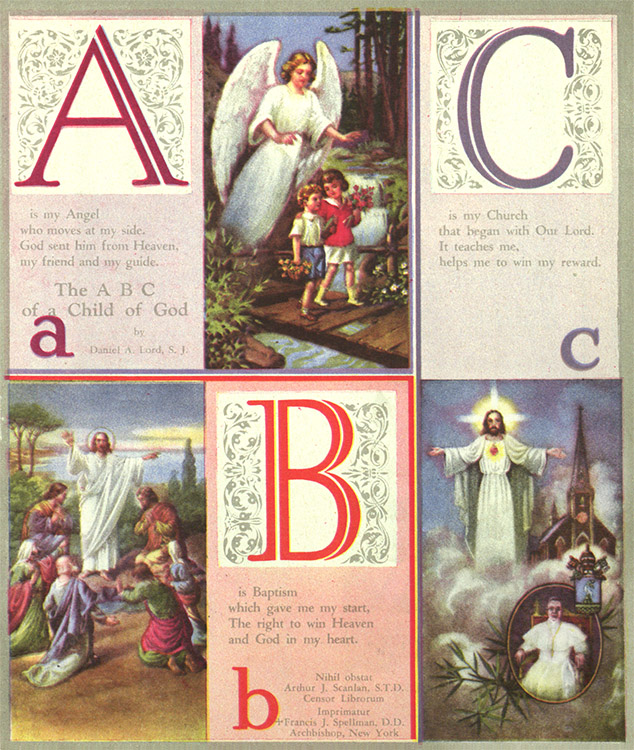
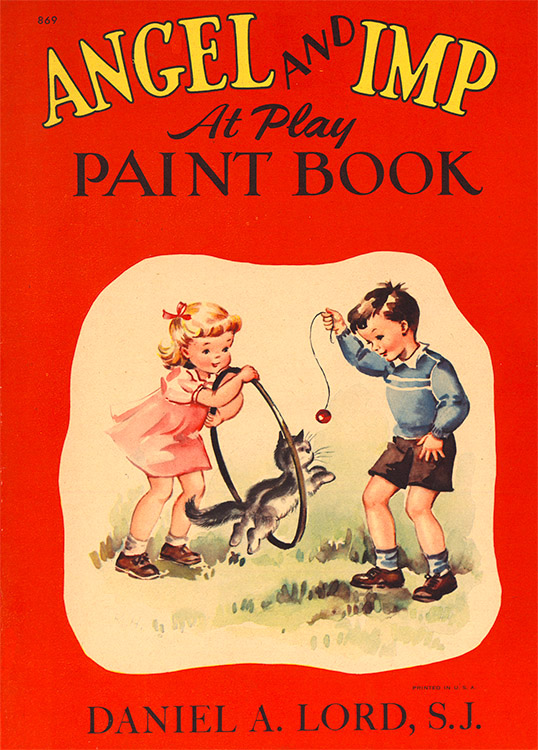
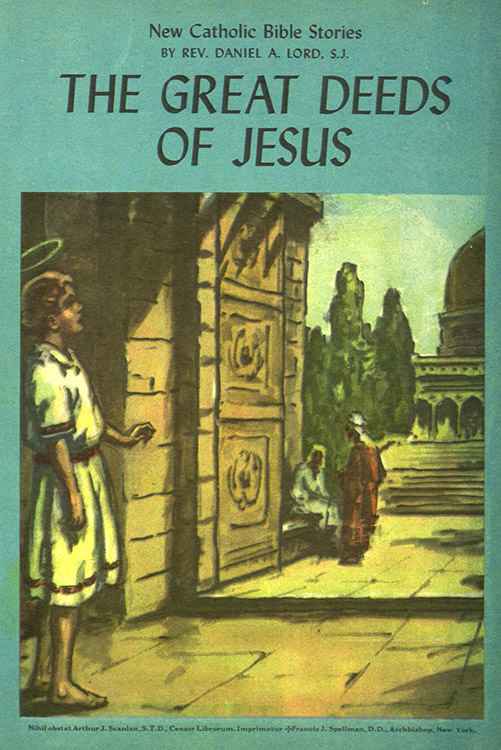
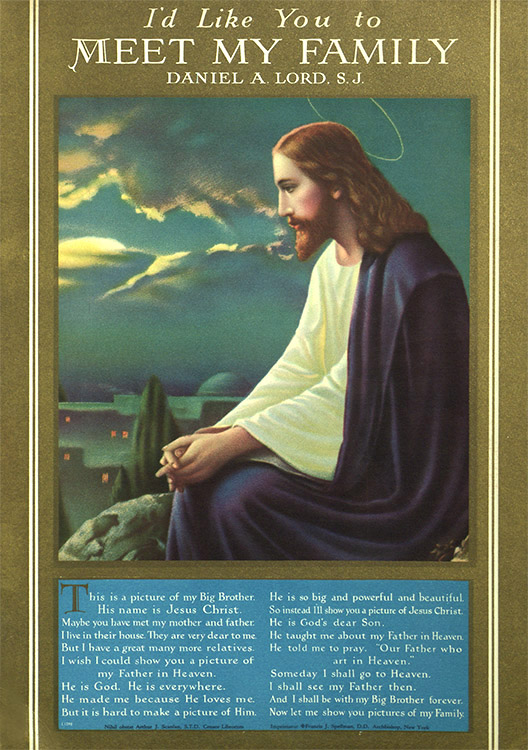
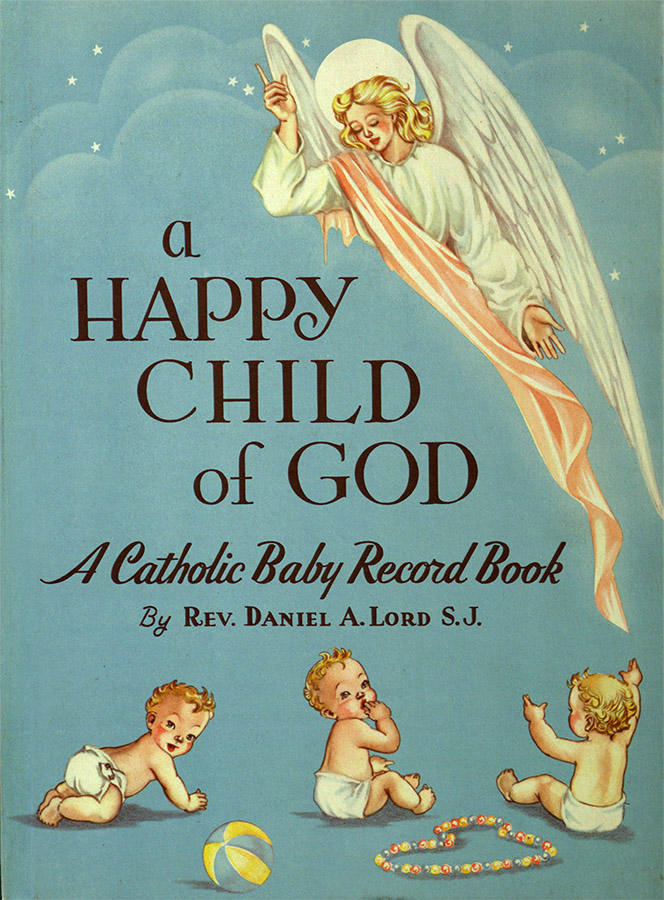
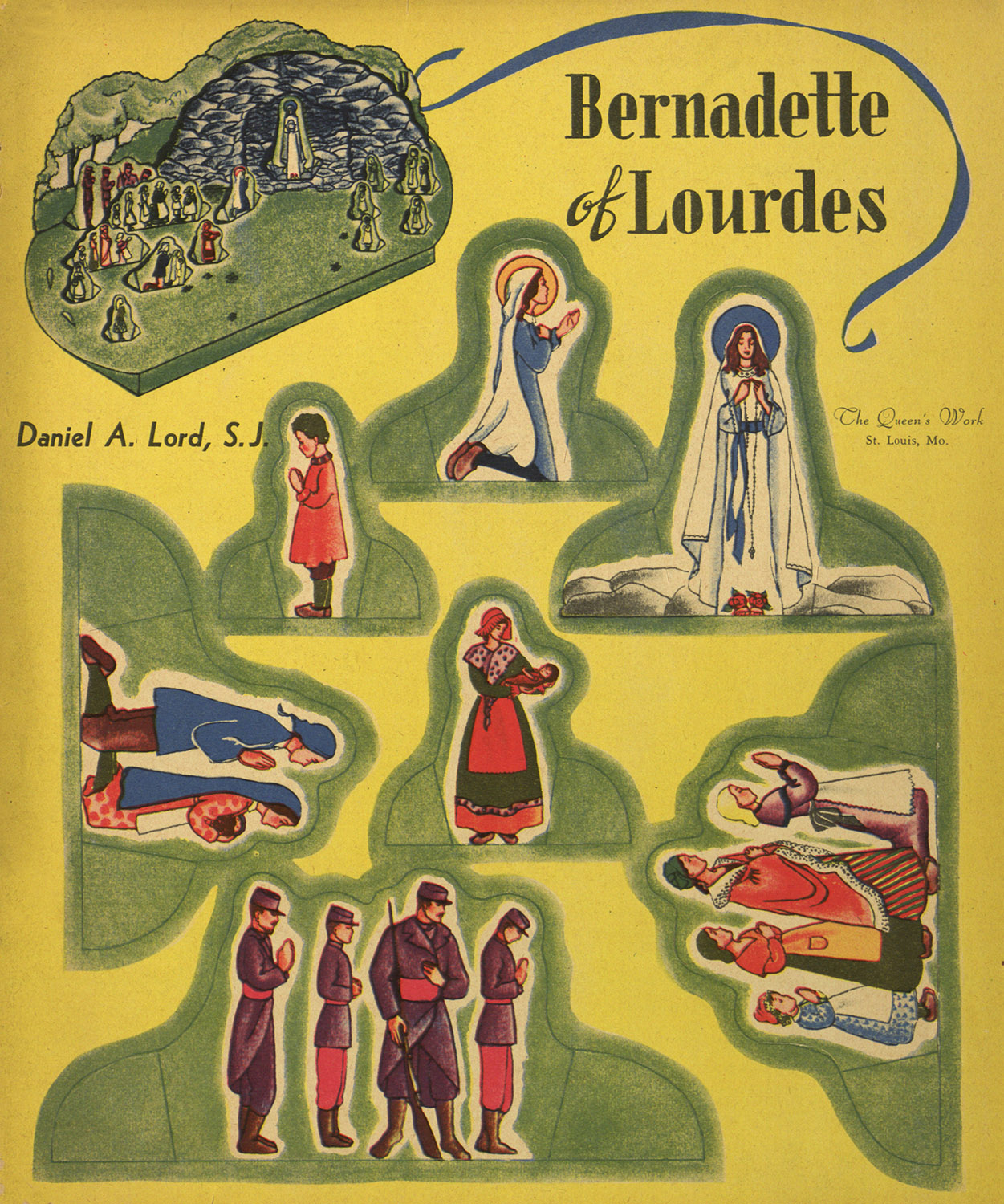
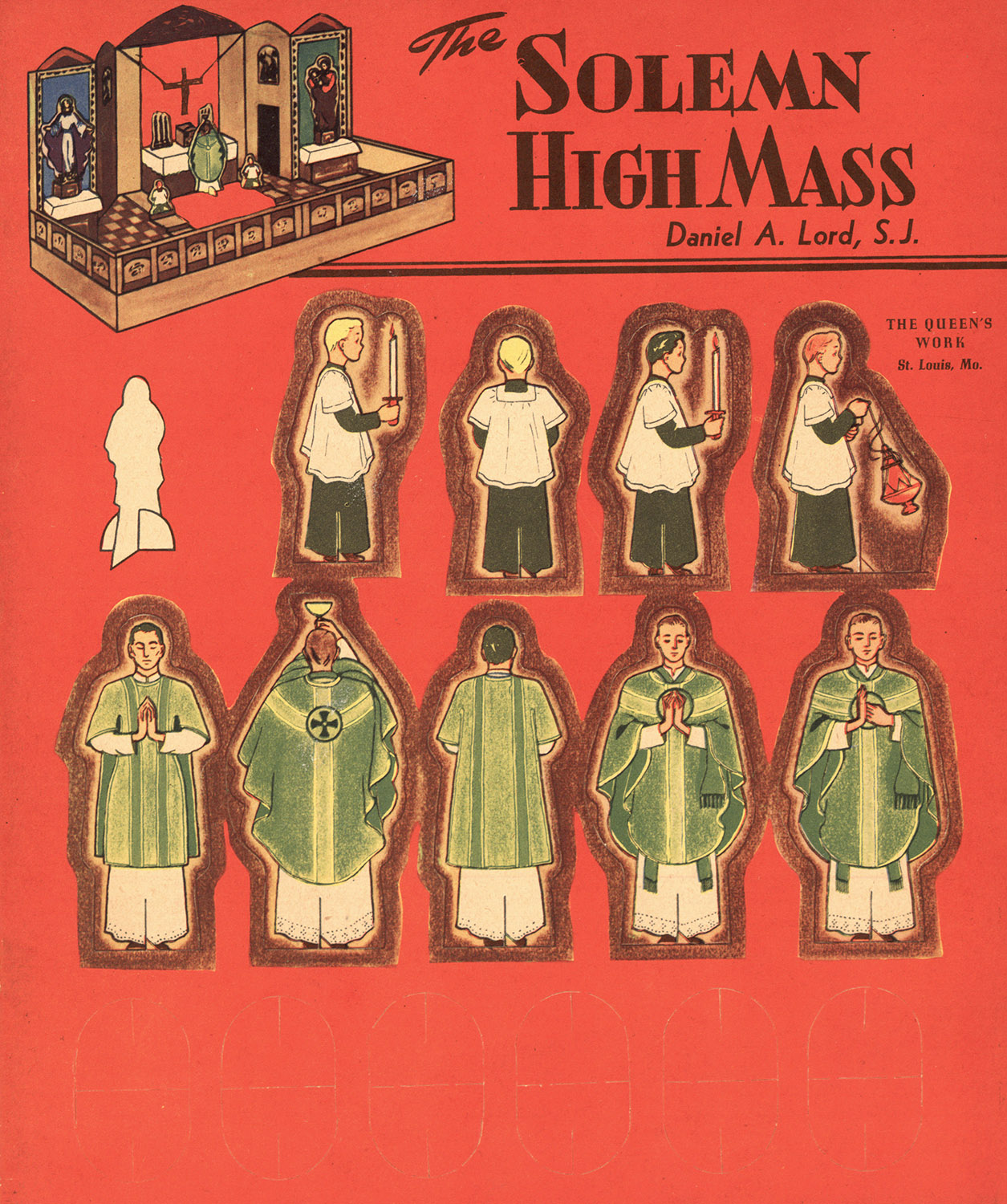
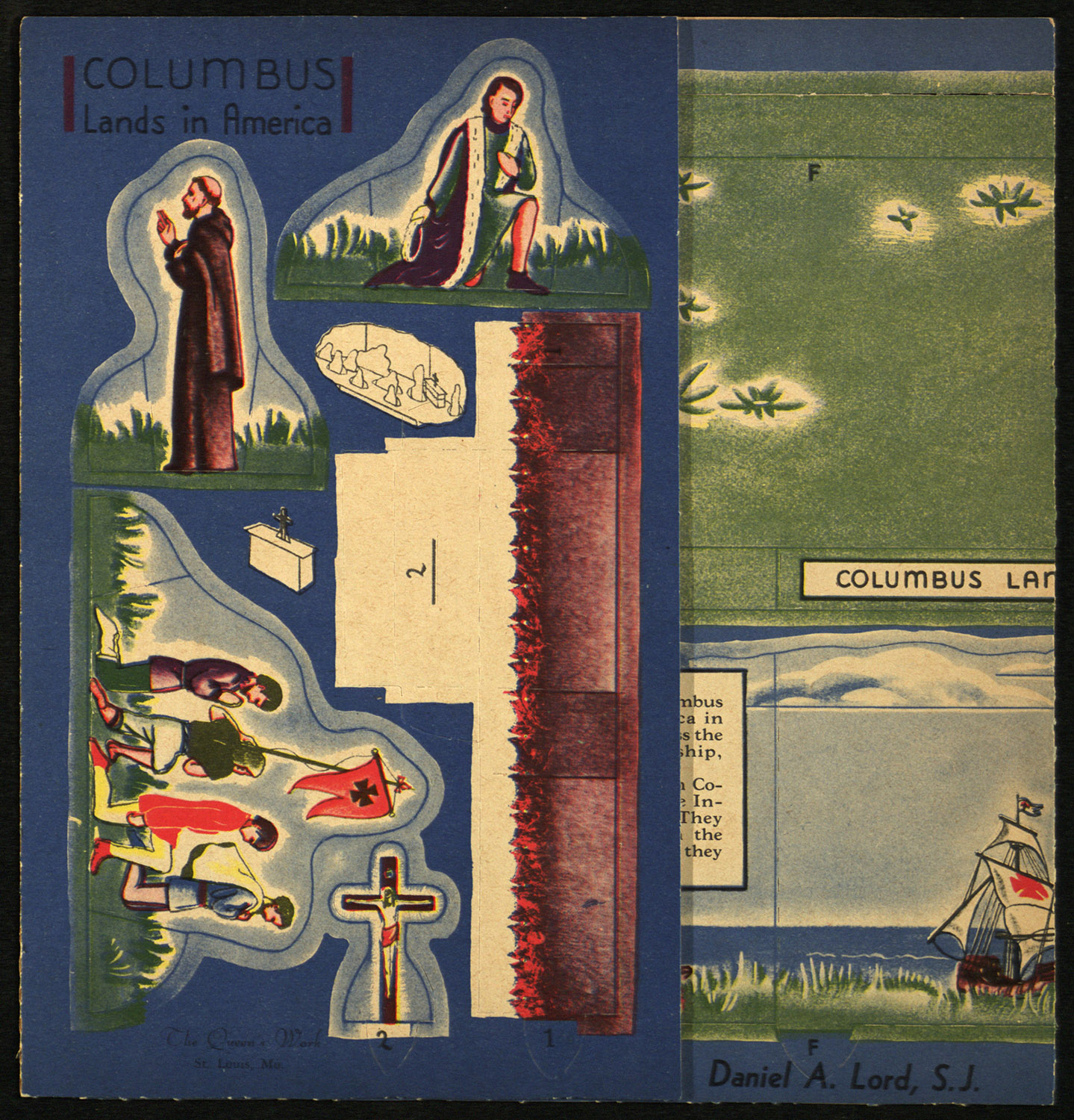
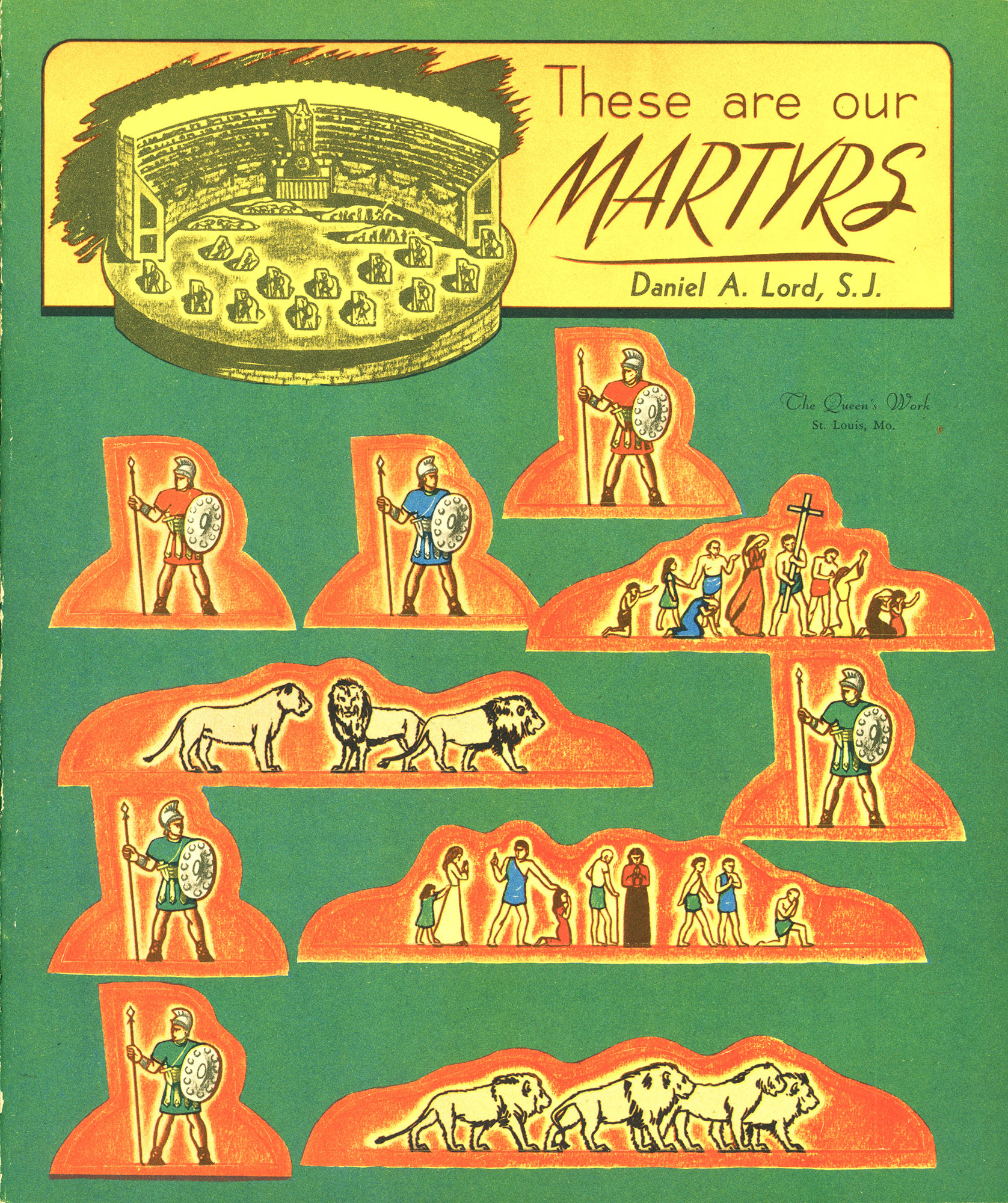
Lord’s Children’s Book and Cut-outs
NOTES
- 1 Lord, Don’t Be a Liar!, (QW, 1933), 32.
- 2 Sparr, To Promote, 34.
- That Made Me Smile, 13-14. Story trimmed.
- 4 Ibid., 21-22.
- 5
Salesmanship, Not Syllogisms, Urged by Jesuit,
Herald Tribune 19 November 1940. - 6 Gavin, 124-25.
- 7 Lord, That Made Me Smile, 79.
- 8 Lord, Death Isn’t Terrible (QW, 1940.), 25.
- 9 Ibid., 26.
- 10 Ibid., 4-5.
- 11 Ibid., 20.
- 13 Lord, So You Won’t Fight, Eh? (QW, 1940), 5.
- 14 Ibid., 6.
- 15 Ibld., 7.
- 16 Ibid., 6.
- 17 Ibid., 8.
- 18 Ibid., 6.
- 19 Ibid., 6-7.
- 20 Ibid., 10.
- 21 Ibid., 11.
- 22 Ibid., 16.
- 23 Adam Hochschild, To End All Wars: A Story of Loyalty and Rebellion, 1914–1918 (Boston : Houghton Mifflin Harcourt, 2011). His 1999 book, King Leopold’s Ghost: a Story of Greed, Terror, and Heroism in Colonial Africa is a ‘must read’ for anyone wanting to see how history and economics can play out in the real world.
- 24 Lord, What is a Jesuit? (QW, 1940), 6-7. List edited and shortened.
- 25 Lord, What IS Decent Literature? (QW, 1940).
- 26 Ibid., 17.
- 27 Ibid., 29.
- 28 Lord, You’ve a Right to Be Happy (QW, 1940), 1-2.
- 29 Ibid., 3-4.
- 30 Ibid., 4.
- 31 Ibid., 5. Rotogravure was a printing process to produce both black and white and color images. Into the 1960s many newspapers did not include photos because it was too expensive to print newspapers with them. Many newspapers had a weekend section often called the ‘Rotogravure’ with lots of photos, especially society photos. The 1948 movie Easter Parade has this line from the Irving Berlin song
On the avenue, Fifth Avenue, the photographers will snap us, And you’ll find that you’re in the rotogravure.
- 32 Ibid., 6.
- 33 Ibid., 7.
- 34 Ibid., 8-9.
- 35 Ibid., 9.
- 36 Ibid, 10.
- 37 Ibid., 11.
- 38 Ibid., 19.
- 39
Election Year Follies,
St, Louis Post Dispatch, March 26, 1940, 4, quoted in Barmann, 83. - 40 Lord,
The Election Year Follies
1940, manuscript in Jesuit Archives, 1 - 41 Ibid., 2.
- 42 Ibid., 4.
- 43 Ibid., 6.
- 44 Ibid., 9.
- 45 Ibid., 17.
- 46 Ibid., 26.
- 47 Ibid., 27.
- 48 Ibid., 29.
- 49 Ibid., 30.
- 50 Barmann, 38.
- 51 Ibid., 8. The Fighting 69th was a legendary army regiment from New York City.
- 52 Lord, Don’t Be a Liar!, 23.
- 53 Lord, Don’t Hate Your Job (St. Louis: QW, 1941), 32.
- 54 Going Steady, 12.
- 55 Ibid., 8.
- 56 Ibid., 11.
- 57 Lord, Here’s Why We Love Our Country (QW, 1941), 4.
- 58 Ibid., 23.
- 59 Lord, So We Abolished The Chaperone (QW, 1941), 13.
- 60 Ibid., 13.
- 61 Ibid., 21-22.
- 62 Ibid., 22-23.
- 63 Lord, When We Go to Confession (QW, 1941).
- 64 Ibid., 71.
- 65 Gavin, 125.
Copyright 2021 Stephen Werner